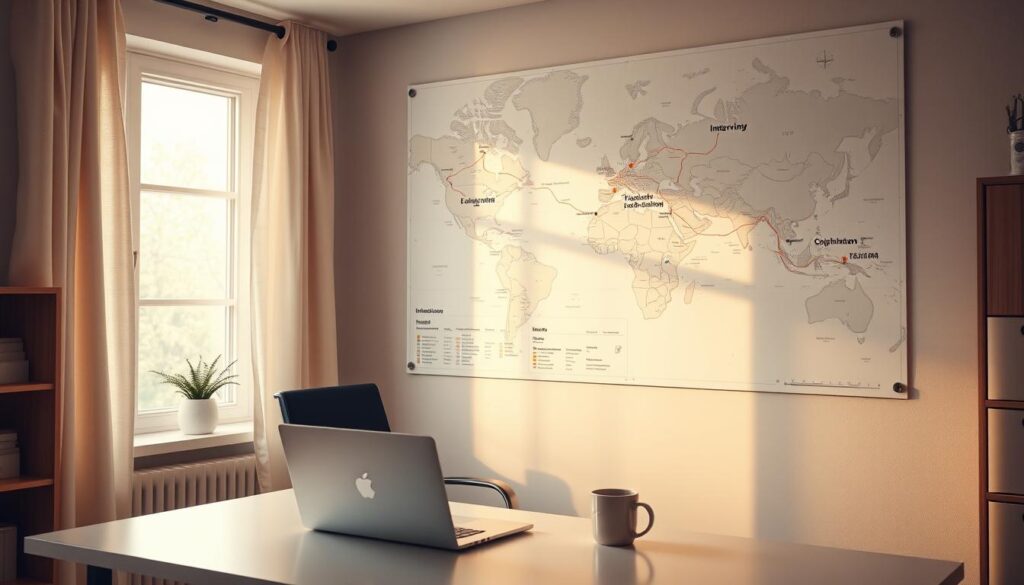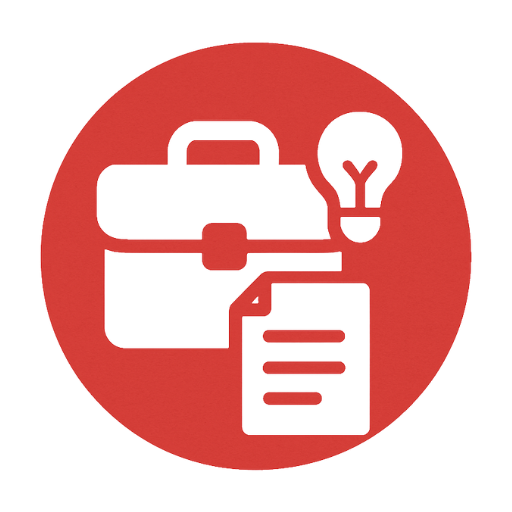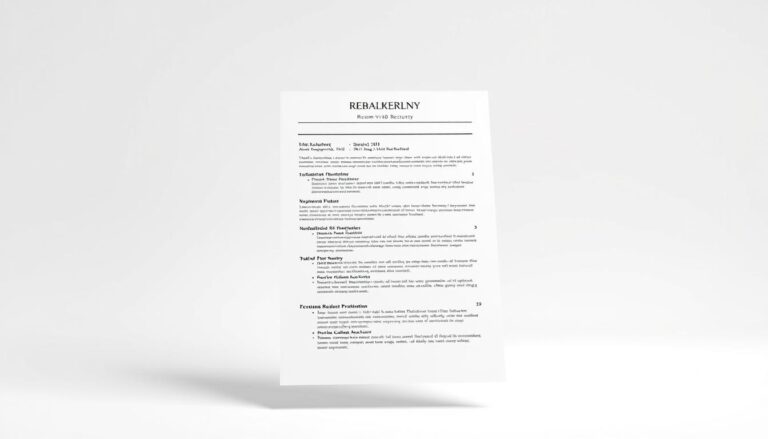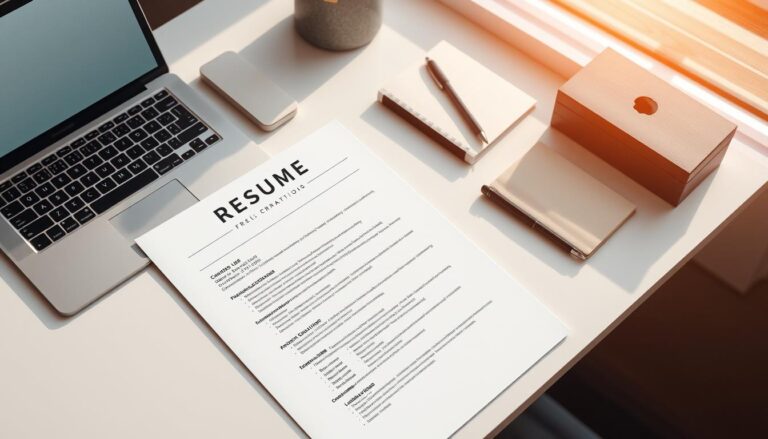How to Prepare for a Job Interview in 24 Hours

Preparing for a job interview in just 24 hours can be tough. But with the right plan, you can impress and get the job. Our expert advice will show you effective interview preparation tips to impress potential employers.
With little time, focus on the most important things. Job Interview Preparation means researching the company, knowing common interview questions, and practicing your answers. By focusing on these, you can make a big difference in a short time.
To ace an interview, you need knowledge, confidence, and preparation. Follow our tips to make a great first impression.
The 24-Hour Job Interview Challenge
The 24-hour job interview challenge is tough, but you can succeed with good preparation. When time is short, managing your time well is key. You must focus on tasks that will have the biggest impact.
Start by learning about the job and the company. This first step is crucial for interview preparation. It lets you tailor your answers to what the employer wants. Divide your 24 hours into parts: research, reviewing your resume, practicing interview questions, and preparing materials.
Begin by researching the company and the job. This helps you understand the company’s values and what skills they need. Then, check your resume and application to make sure they fit the job.
Practice answering common interview questions next. This will help you speak about your skills and experiences clearly. Finally, get your outfit and any other materials ready for the interview. With good time management, you can make a big difference even with a tight deadline.
Research the Company and Position
Getting ready for a job interview means learning as much as you can about the company and the job. You should research the company’s mission, vision, values, products, and services. It’s also important to know about its competitors and who its customers are.
Reviewing the Company’s Website and Social Media
Start by checking the company’s website. Look for ‘About Us,’ ‘Our Mission,’ and ‘Our Team’ sections. These can give you a feel for the company culture and values. Also, check their social media to see what they’ve been up to lately.
By looking at the company’s website and social media, you can learn a lot. This knowledge will help you answer questions during the interview. For example, if you know about the company’s current projects, you can talk about how your skills can help.
It’s also key to understand the job description. Study the job requirements and think about how your skills and experiences fit. Being prepared will make you more confident and show you’re really interested in the job.
In short, doing your homework on the company and job is essential for a good interview. It makes you more confident, shows you’re excited about the job, and helps you answer questions in a way that fits the company’s needs.
Analyze Your Resume and Application Materials
Your resume is often the first impression you make on the interviewer, so make it count. It’s important to keep it updated, accurate, and relevant to the position.
A thorough Resume Review means checking for outdated info, mistakes, or details that don’t fit the job. Tailor your resume to show off the skills and experiences that match the job.
Your Cover Letter is key too. It should add to your resume by showing how your skills and experiences make you a great fit for the job.

Looking over your Application Materials means checking the look, layout, and for any typos or grammar errors. Make sure your resume and cover letter are easy to read and well-formatted.
By carefully reviewing and improving your resume and application materials, you show you’re professional and detail-oriented. This makes a good impression on the interviewer even before you meet.
How to Prepare for a Job Interview in 24 Hours: The Strategy
To get ready for your interview in just 24 hours, you need a solid Interview Preparation Strategy. This means researching the company, reviewing your resume, and practicing interview questions.
Start by making a plan for your 24 hours. Spend the first hours on researching the company. Learn about its values, mission, and culture. This helps you tailor your answers to fit the company’s goals.
Then, dive into reviewing your resume and application. Make sure you can talk about your experiences and qualifications. Prepare examples that show off your skills and achievements.
Time Management is key in this short time. Set aside time for practicing interview questions, getting your outfit ready, and planning your interview day.
Prioritization is also important. Focus on the most common interview questions. Practice your answers using the STAR method (Situation, Task, Action, Result).
By sticking to this plan, you can make the most of your 24 hours. You’ll feel more confident for your interview.
Anticipating and Preparing for Common Interview Questions
When you’re facing a job interview with just 24 hours’ notice, knowing common interview questions can be a big help. It lets you prepare answers that show off your skills and experiences. This makes a great impression.
Common Interview Questions usually ask about your background, why you’re leaving your current job, and your future plans. Being ready for these questions lets you talk about your strengths and weaknesses confidently.
Behavioral Interview Questions are also important. They start with “Tell me about a time when…” or “Can you give an example of…”. They check how you’ve handled past situations to predict your future performance. To get ready, think about your past experiences and make stories that show your skills and achievements.
Practicing is essential to prepare for these questions. Use the STAR method: Situation, Task, Action, Result. It helps you tell clear, short stories that show your worth.
Also, think about the job’s specific needs and how your skills and experiences match them. This shows you’ve researched the company and are really interested in the role.
By focusing on Interview Preparation and practicing your answers, you’ll feel confident in the interview. The goal is to be comfortable talking about your experiences and qualifications, not to memorize answers.
Developing Your Success Stories
Preparing success stories is a great way to show your skills in an interview. Use the STAR framework to structure your stories. This makes it easy for interviewers to see your achievements and skills.
The STAR method is simple. Start with the situation (Situation). Then, describe the task or challenge (Task). Explain the actions you took (Action). Finally, share the outcome (Result).
For instance, if you’re asked about overcoming a tough challenge, use the STAR method. You might talk about a project that was delayed. Describe how you managed the team and resources to get it back on track. Then, share how you successfully completed the project on time.
Having several success stories ready will help you answer many behavioral interview questions. It shows your skills and achievements clearly and effectively.
Preparing Questions to Ask the Interviewer
Preparing thoughtful questions for the interviewer is key. It shows you’re excited about the role and well-prepared.
Think about asking about the company culture. Knowing the work environment and values helps you see if it’s right for you.
Some good questions to ask the interviewer are: “What are the biggest challenges facing the team right now?” or “Can you tell me more about the company’s approach to professional development?”
Asking smart questions can give you important info about the job and company. It also shows you’re really interested and engaged.
Planning Your Interview Outfit and Materials
Choosing the right interview outfit is key to getting ready for a job interview. What you wear can greatly affect how you’re seen by your potential employer.
Think about the company culture and the job you’re applying for. For example, a creative agency might be more casual, while a corporate law firm needs formal clothes. Make sure you match the company’s dress code.
Also, get your interview materials ready. Carry extra copies of your resume, a notebook, and a pen. Keep your stuff organized and within reach during the interview.
Wearing the right professional attire and having your materials ready will make you feel more confident. It shows you’re serious and ready for the job.
Day-of Interview Logistics and Final Preparations
As the interview day gets closer, it’s key to get your logistics in order. This ensures a smooth and stress-free experience. Planning your arrival time and route planning are crucial parts of interview logistics.
Plan to arrive at least 15 minutes early. This helps avoid delays and stress from unexpected issues. Check the weather and traffic updates to prepare for any problems. Use a GPS or mapping service to find the best route to the interview. Doing a dry run can also help you get familiar with the route.

Also, get your outfit and materials ready the night before. Lay out your clothes and iron them if needed. Make sure you have all important documents, like extra copies of your resume and references, ready. This preparation will make you feel more in control and confident on the big day.
On the day of the interview, check that you have everything you need before leaving. Charge your phone and have a backup plan for transport if needed. By focusing on these interview logistics, you can reduce stress. This lets you focus on showing off your skills and qualifications during the interview.
Conclusion: Making the Most of Your Limited Preparation Time
Preparing for a job interview in 24 hours is tough, but you can still do well. You’ve researched the company, looked over your resume, and thought about common interview questions. You’ve also worked on your success stories.
When you go to the interview, stay calm and be yourself. You’ve prepared as much as you can, and you bring valuable skills and experience. Take a deep breath, relax, and let your personality show. You’ve made the most of your time.
It’s normal to feel nervous, but being well-prepared helps. You’ll be ready for tough questions and can make a good impression. Stay calm and confident.






